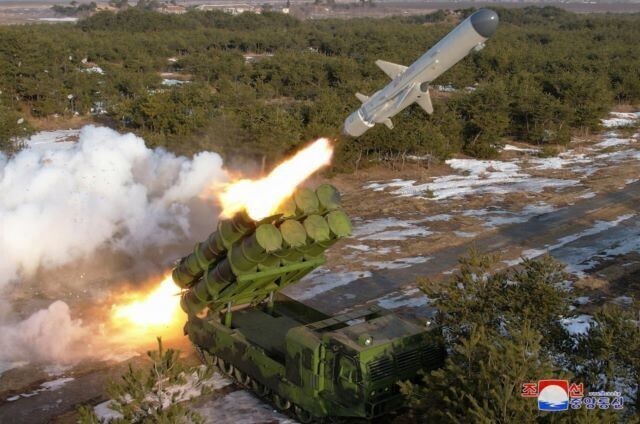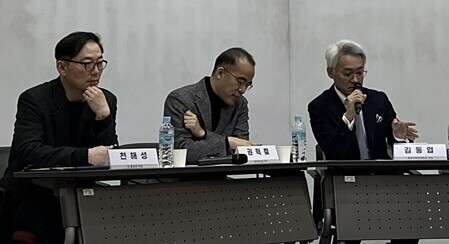hankyoreh
Links to other country sites 다른 나라 사이트 링크
Full-scale war may not be in store for Korea, but limited war would still come with a price

Lately, it’s not just Koreans who are wondering if a war might be in store for the peninsula. The new year has brought a new level of intensity to the rhetorical barbs and military chest-thumping on either side of the DMZ.
With both sides ramping up their military readiness and sharpening their taunts of “go ahead, try me,” antagonism is rising on both a physical and psychological level. While past crises between the two Koreas were settled through dialogue, talks seem increasingly unlikely in the current showdown. The crisis deepens and tensions are rising, with no exit ramp in sight.
What do the experts think of the current situation? To find out, the Rhee Yeung Hui Foundation and the Hankyoreh Foundation for Reunification and Culture hosted two forums this month. The experts who took part in the debates seemed to all agree that the chances of a full-scale war are unlikely.
While both Pyongyang and Seoul are boasting that they won’t back down from a direct conflict, it’s clear that neither side is willing to throw the first punch. But that doesn’t mean we can rest easy, the panelists warned. We can’t rule out the chances of an unintentional skirmish or a regional conflict.
The biggest concern is the return of hot conflict in the vicinity of the Northern Limit Line (NLL), the de facto maritime border off the western coast of the peninsula.

The nullification of the 2018 Sept. 19 inter-Korean military agreement last fall rendered the buffer zones north and south of the NLL nonexistent. As such, the two Koreas have started to conduct artillery drills as well as concentrating their forces in such areas.
North Korea has, from the beginning of the new year, wholly rejected the NLL while stating that if “the enemy” crosses the maritime border it recognizes, it will regard the intrusion as an armed provocation and will not hesitate to retaliate forcefully.
In response, South Korea is emphasizing that the NLL is an authentic maritime demarcation line and that the country will commence a “swift, forceful and definitive” response if North Korea initiates provocations.
Will the waters off the peninsula’s western coast once again live up to their nickname of “the powder keg” of the Korean Peninsula?
At a debate hosted by the Rhee Yeung Hui Foundation on Feb. 16, Kim Yeon-chul, a former minister of unification under President Moon Jae-in and current professor at Inje University, said that while the possibility of an unintended clash “cannot be ruled out,” two developments have arisen in the deterrence of armed conflict.
First, unlike in the past, policies such as the establishment and enforcement of fishing boundaries to prevent conflicts have been put in place.
Second, Kim Yeon-chul said it was “unlikely that North Korea has the military power to jockey for the maritime border it recognizes.” While North Korea may politically declare its own maritime border, the former unification minister says, “whether they can back up that claim with their military is a different matter entirely.”
Also attending the debate, Moon Jang-nyeol, a former professor at Korea National Defense University, concurred that North Korea would be incapable of militarily regulating a self-proclaimed maritime border, as its military disadvantage in the West Sea would put it at risk of major casualties.
Still, he analyzed that the proclamation of this border will be “hard to backpedal on, as Kim Jong-un has already brought the issue up.” The former professor concluded that it was difficult to parse the exact calculus behind such declarations by the North.
To prepare for such uncertainties, dialogue must be resumed sooner than later, Moon said, while noting hurdles posed by the current state of inter-Korean relations and the “difficulty of pinning hopes of such sort on the Yoon Suk-yeol administration.”
The conflict in the West Sea, also known as the Yellow Sea, was the biggest issue up for debate at the event hosted by the Hankyoreh Foundation for Reunification and Culture on Tuesday.
Former naval officer and professor at the University of North Korean Studies Kim Dong-yup expressed concern about the current situation, which he called “unprecedented in that there are no communication channels between the two Koreas,” as the safety pin keeping the grenade of inter-Korean tensions from exploding — the Sept. 19 inter-Korean military agreement — has been removed.
In such a situation, naval drills by either side could lead to misjudgments and miscalculations, which could lead to an escalation in the form of an unintended clash.
Kwon Hyuk-chul, the Hankyoreh’s inter-Korean affairs and unification editor, said that while the Yoon administration is confident that peace will be preserved on the peninsula thanks to its establishment and flaunting of a stalwart stance against all North Korean provocations, he questions whether the administration or the military are truly demonstrating their capabilities for crisis management.
The government must face the fact that “the more it emphasizes peace through strength, the more anxious the public will become,” Kwon said.
While experts generally assessed that the risk that a limited clash like that which could occur in the peninsula’s coastal waters was unlikely to escalate into a full-scale war, they stressed that the situation still carries risk.
“Compared to the past, North Korea’s nuclear capabilities have grown extraordinarily. The extended deterrence of the South Korea-US alliance has also become much more sophisticated, so it’s fair to say that a mutual deterrence is being maintained on all fronts,” assessed Kim Yeon-chul.
The former minister of unification also argued that since the agent of wartime operational control of South Korean forces — that is, the US — is another factor in play as to whether a conflict escalates into war, this acts as another deterrent against full-scale war.
At the same time, the expert underscored that the current circumstances “cannot be considered A-OK.”
If the risk of accidental conflict and other national security anxieties become entrenched and prolonged, South Korea’s economy, which is already in recession, will suffer even more.
While the fear of absolute annihilation acts as a deterrence to war, “assuming that a limited war will not occur simply because a full-scale war is unlikely to break out is dangerous, and might even have the opposite effect,” argued Kim Dong-yup.
What preventative measures can be taken to prevent a limited war and what would prevent such a war from escalating into a full-scale war is still unclear, according to the professor.
The consensus of the experts at both debates was that while the risk of a full-on war is low, the risk of accidental or limited conflict is ever-present. All participants agreed that in order to overcome the current instability, efforts must be made to create an atmosphere conducive to inter-Korean dialogue, starting with messaging and crisis management.
“The Yoon administration lacks a systematic approach, and is constantly saying one thing and then doing another,” assessed Kwon, who suggested that the two Koreas initiate change by reining the rhetorical barbs they’ve been exchanging of late.
According to Kim Dong-yup, it may be “more efficient to focus on discourse surrounding peace, stability, and disarmament rather than on issues surrounding kinship and unification.” The professor said it is time to “change our approach to this problem for the sake of the generations to come.”
Moon emphasized the need for advocates for peace to get politically organized. He noted that while there is no denying the role that the Yoon Suk-yeol administration has played in this situation, the Moon Jae-in administration should also be held responsible, and added that “a proper advocate for peace should come to power and implement appropriate policies.”
By Cheong Wook-sik, director of the Hankyoreh Peace Institute and director of the Peace Network
Please direct questions or comments to [english@hani.co.kr]

Editorial・opinion
![[Guest essay] Preventing Korean Peninsula from becoming front line of new cold war [Guest essay] Preventing Korean Peninsula from becoming front line of new cold war](https://flexible.img.hani.co.kr/flexible/normal/500/300/imgdb/original/2024/0507/7217150679227807.jpg) [Guest essay] Preventing Korean Peninsula from becoming front line of new cold war
[Guest essay] Preventing Korean Peninsula from becoming front line of new cold war![[Column] The state is back — but is it in business? [Column] The state is back — but is it in business?](https://flexible.img.hani.co.kr/flexible/normal/500/300/imgdb/original/2024/0506/8217149564092725.jpg) [Column] The state is back — but is it in business?
[Column] The state is back — but is it in business?- [Column] Life on our Trisolaris
- [Editorial] Penalties for airing allegations against Korea’s first lady endanger free press
- [Editorial] Yoon must halt procurement of SM-3 interceptor missiles
- [Guest essay] Maybe Korea’s rapid population decline is an opportunity, not a crisis
- [Column] Can Yoon steer diplomacy with Russia, China back on track?
- [Column] Season 2 of special prosecutor probe may be coming to Korea soon
- [Column] Park Geun-hye déjà vu in Yoon Suk-yeol
- [Editorial] New weight of N. Korea’s nuclear threats makes dialogue all the more urgent
Most viewed articles
- 1Yoon’s broken-compass diplomacy is steering Korea into serving US, Japanese interests
- 2[Guest essay] Preventing Korean Peninsula from becoming front line of new cold war
- 3S. Korean first lady likely to face questioning by prosecutors over Dior handbag scandal
- 4Yoon’s revival of civil affairs senior secretary criticized as shield against judicial scrutiny
- 5‘Weddingflation’ breaks the bank for Korean couples-to-be
- 6Behind-the-times gender change regulations leave trans Koreans in the lurch
- 7Japan says it’s not pressuring Naver to sell Line, but Korean insiders say otherwise
- 8Lee Jung-jae of “Squid Game” named on A100 list of most influential Asian Pacific leaders
- 9After 2 years in office, Yoon’s promises of fairness, common sense ring hollow
- 10South Korean ambassador attends Putin’s inauguration as US and others boycott